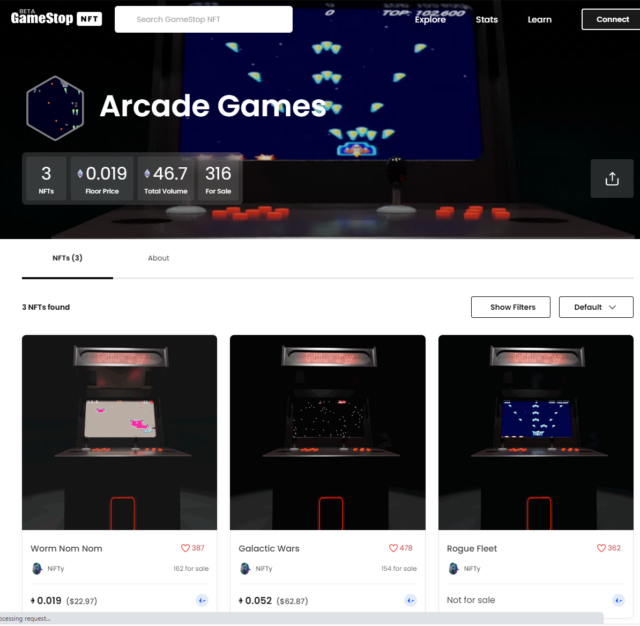Indie devs outraged by unlicensed game sales on GameStop’s NFT market [Updated]
![Indie devs outraged by unlicensed game sales on GameStop’s NFT market [Updated]](https://rassegna.lbit-solution.it/wp-content/uploads/2022/08/indie-devs-outraged-by-unlicensed-game-sales-on-gamestops-nft-market-updated.jpg)
In the first week of GameStop’s recently launched NFT marketplace, the NiFTy Arcade collection stood out from the pack. Instead of offering basic JPEGs, the collection provided “interactive NFTs” linked to HTML5 games that were fully playable from an owner’s crypto wallet (or from the GameStop Marketplace page itself).
There was only one problem: Many of those NFT games were being minted and sold without their creators’ permission, much less any arrangement for the creators to share in any crypto profits.
While the man behind NiFTy Arcade has since been suspended from GameStop’s NFT marketplace, he’s still holding on to the tens of thousands of dollars in cryptocurrency he made by selling those NFTs before the suspension. And while the NFTs in question are no longer listed on the GameStop NFT marketplace, the unlicensed games themselves can still be accessed on GameStop’s servers and across a distributed file storage system, where they may now be functionally impossible to remove.
What if an arcade, but with NFTs?
NiFTy Arcade creator Nathan Ello told Ars his collection grew out of a desire “to highlight potential use cases for NFTs beyond static images.” But Ello got a bit abstract when asked to explain the utility of freshly minted NFT versions of games that were already freely playable elsewhere on the web.
“If people find value in these NFTs, that’s a bonus, but my intent is to create and showcase games that are playable within NFT marketplaces and within NFT wallets,” he told Ars. “Should someone want the convenience of playing the game directly from their wallet or their own profile page on the marketplace without having to navigate to mine, then they’re welcome to buy a copy.”

Ello ended up selling hundreds of NFTs based on the NiFTy Arcade collection’s first three games, making at least 46.7 ETH (worth about $55,000 at the time) from those sales as of July 15 (Update: NiFTy Arcade has clarified to Ars that it earned only 8.4 ETH from initial sales of the NFTs in question. The remainder of the 46.7 ETH cited was secondary sales, on which NiFTy Arcade earned just a 10 percent fee. Ars regrets the confusion.) But for at least two of those games—Worm Nom Nom and Galactic Wars—Ello admitted he never sought the necessary permission from the original creators before selling them. There’s also evidence that Ello minted and distributed a number of other games through NFT marketplaces without the creators’ permission, including Breakout Hero, Super Disc Box, and Invader Overload, according to Joseph “Lexaloffle” White, the creator of the PICO-8 pixel game engine.
https://arstechnica.com/?p=1871371